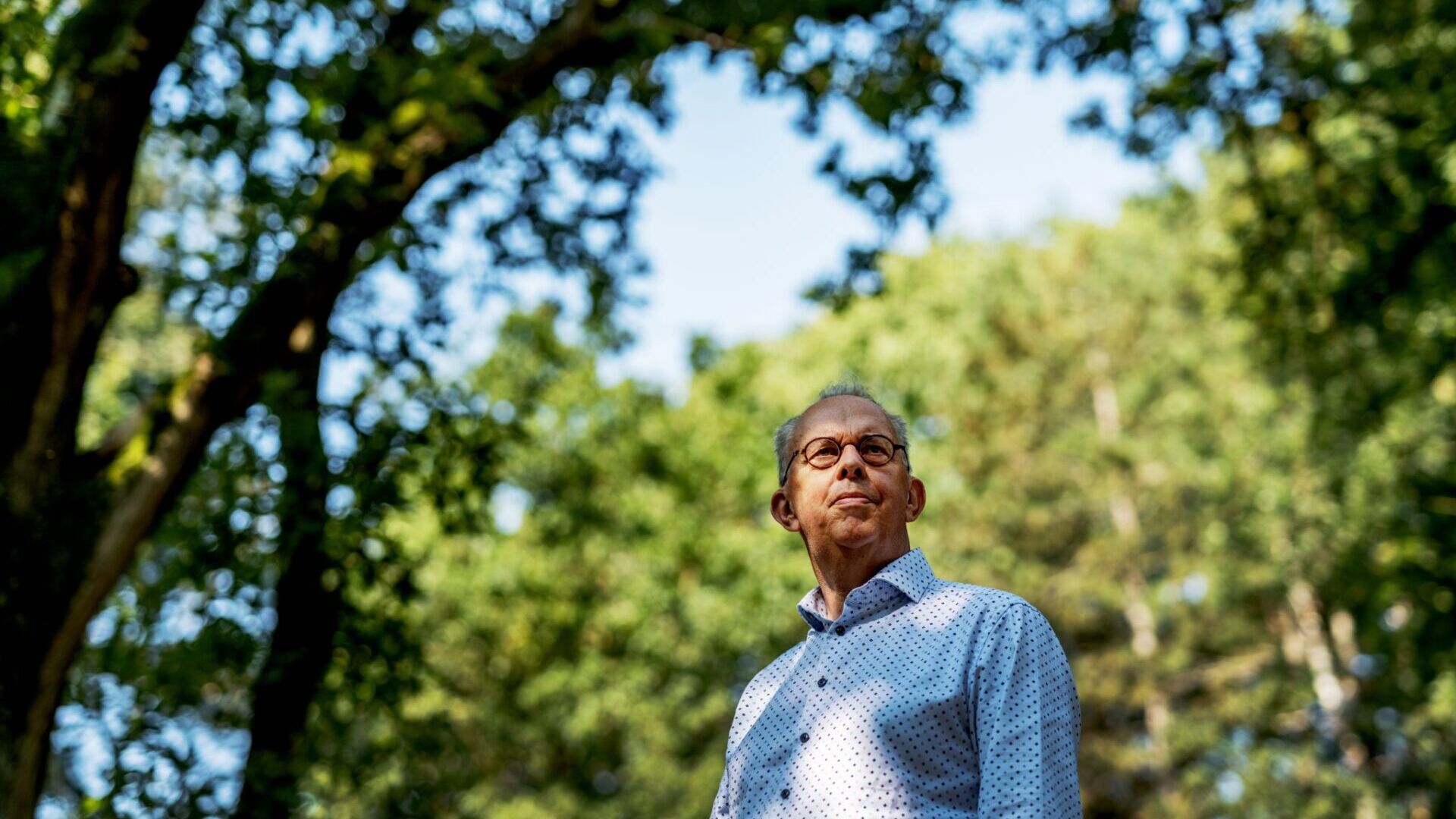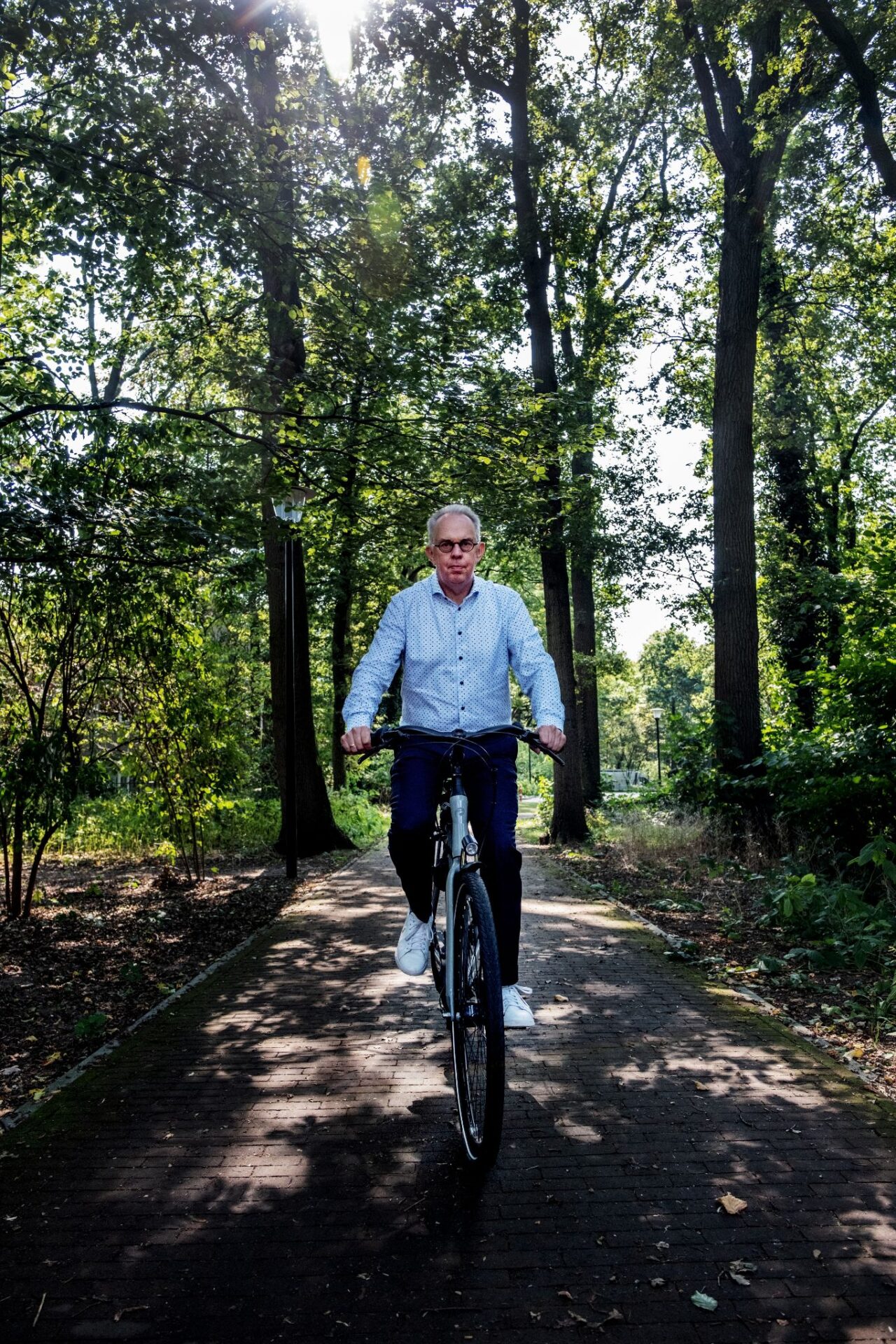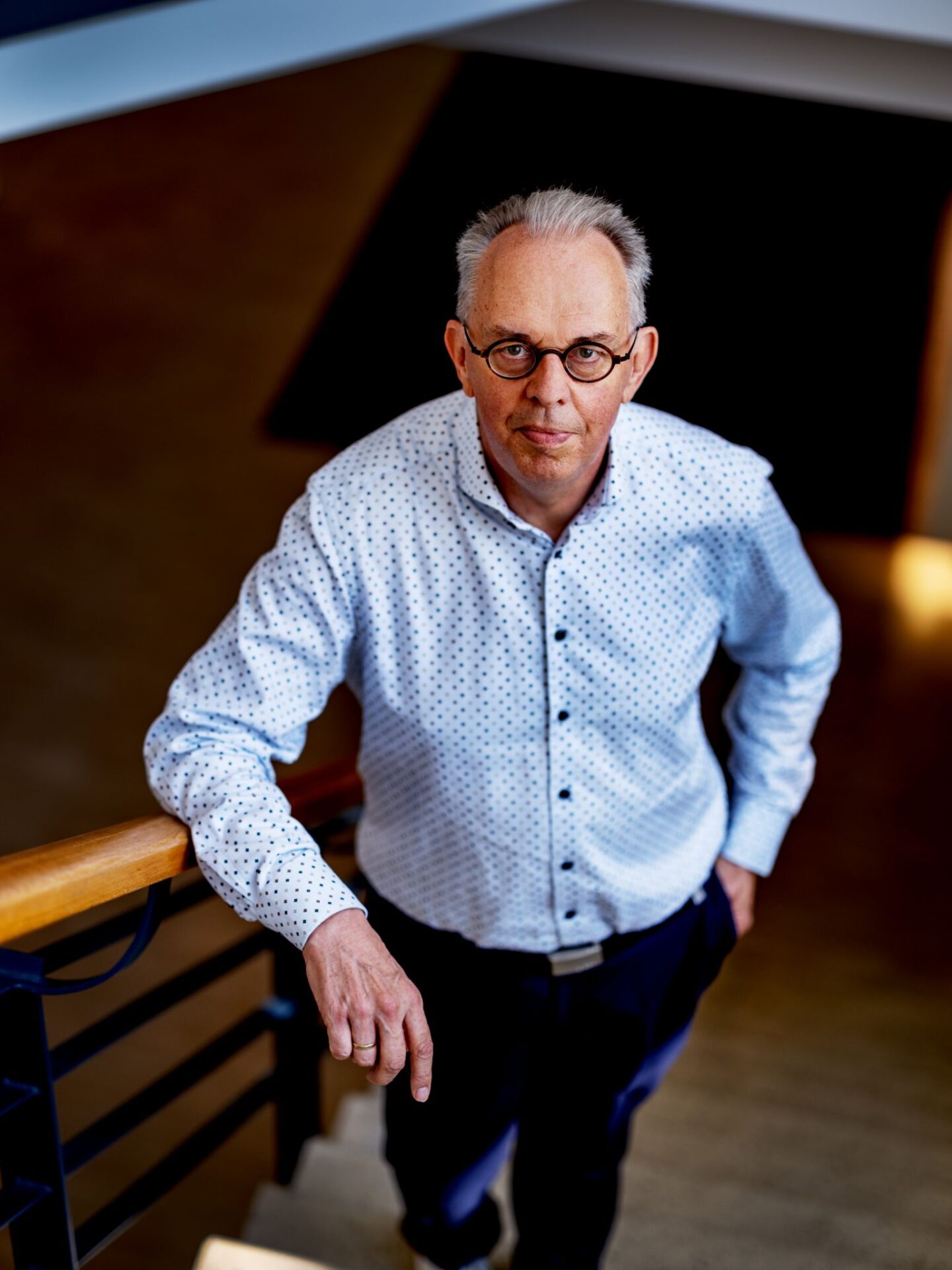Peter Hagoort, founder of the Donders Institute, retires. ‘I have an aversion to diva behaviour.’
-
 Peter Hagoort gaat met pensioen. Foto: Duncan de Fey
Peter Hagoort gaat met pensioen. Foto: Duncan de Fey
In his younger years, he was a correspondent for Trouw in Suriname. But neuroscientist Peter Hagoort, who is now 70, primarily made a name for himself as the founding director of the Donders Institute. In view of his imminent departure, he looks back on his career. ‘There were three of us when we started in this building.'
Almost 45 years ago, he was sitting opposite Desi Bouterse, with his notepad on the table and his pen at the ready. He was there to report on the press conferences that Bouterse had organised as leader of the military uprising in Suriname after his coup d’état. Peter Hagoort, who was then 26, was a correspondent for the Dutch daily newspaper Trouw. After one such press conference, he raced home through the scorching hot streets of Paramaribo so that he could dictate his article to the newspaper’s typists as quickly as possible. Their response was “Hey Mr Hagoort, you still alive?” or something like that, because Suriname was quite a dangerous place in 1980.
“Being in Suriname taught me how to write under time pressure,” says the Professor of Cognitive Neuroscience and Director of the Donders Institute. “Everything was always so rushed because of the time difference.”
Coincidence
Hagoort did an internship in the former Dutch colony. Not as a journalist, but as a Psychology student who was involved in a linguistic research project. The correspondentship for Trouw came his way by chance, because the regular correspondent had joined the coup leaders and had become a spokesperson for the National Military Council. Hagoort knew a thing or two about writing; he had worked for the school newspaper and the job did not faze him.
“The way in which a career develops is largely determined by chance,” he says.
About Peter Hagoort
Peter Hagoort (who was born in 1954) received the Spinoza Prize of €1.5 million in 2005. As the leader of a research consortium, he secured a mega-grant of €26.7 million in 2012. Much of this went to the Max Planck and Donders Institutes, where it was used for a comprehensive project on the biological, linguistic and psychological aspects of human language ability. Hagoort’s memberships include the Royal Netherlands Academy of Arts and Sciences (KNAW), Academia Europaea and the US National Academy of Sciences. Last year, he received Radboud University’s Silver University Medal and in May 2024, he travelled to Hong Kong to receive the Yuen Ren Chao Prize in Language Sciences (for his contribution to the global understanding of language acquisition). He will give his valedictory lecture in the Stevenskerk on Friday 27 September.
In the end, he did not pursue a career in journalism. It was the tension within the journalism world that bothered him. However, he inevitably continued to write between his other activities, and wrote columns and poems, and drafted nominations. He produced many scientific publications and a book that will soon be available to the general public, but more on that later.
First, let’s talk about coincidence. The very building where we are having this conversation more or less became his workspace by chance. The distinctive, triangular Trigon Building on the Kapittelweg became vacant at the exact same time that Hagoort was spearheading a project to create a prestigious brain research institute in Nijmegen. This was around 2000.
You studied Experimental Psychology in Nijmegen. What set you on the trail of the institution that would ultimately become the Donders Institute?
“That was actually also a coincidence. During a Psychology study trip to Rome, one of my fellow students asked me if I was looking for a part-time job; at the time, he was working as a student assistant at the Max Planck Institute and they needed more people. It just so happened that I was able to use the money. I started by helping to standardise a German aphasia test for the Dutch community. I was not yet familiar with the concept of aphasia (which is a language disorder caused by brain injury, AH), but I found it fascinating. I had an avid interest in language, I was very fond of writing and I was also involved in cabaret theatre. It was while I was at the Max Planck Institute for Psycholinguistics, which was then still housed in the former Canisius College on the Berg en Dalseweg, that I learnt that one small malfunction in the brain could cause our entire linguistic system to crash. One thing then led to another.”
Do you come from an academic family?
“No, absolutely not. My father had a granary. I was born in Oudewater and cycled 16 kilometres to high school in Gouda every day. Unfortunately, my father died when I was 14. My parents had to wait a long time before they had children. By the time I was born, they’d already been married for 18 years. My brother was born the year after me. After my father died, my mother was on her own with two boys, which wasn’t always easy for her. I found it difficult to decide what I wanted to study. I think that the idea of studying Psychology came from some sort of desire to help people. But I was also studying Biology until I obtained my Candidate’s diploma (which is a kind of precursor to the Bachelor’s diploma, AH), because I found it hard to choose between the two disciplines.”
EEG research
He studied in Utrecht and later in Nijmegen, where he subsequently became a student assistant at the Max Planck Institute. During his PhD research, he became intrigued by EEG (electroencephalography), a method that is used to measure electrical activity in regions of the brain. At that time, the equipment was mainly being used by doctors for medical purposes. Scientists who wished to know how the human capacity for language worked didn’t have such equipment at their disposal. But Hagoort knew a neurophysiologist at the hospital, which meant that he was able to secretly collect his own EEG data after all. He eventually shared his covert project with supervisor Pim Levelt, who was also a director of the Max Planck Institute. Hagoort’s boss found the findings interesting enough to allocate funding for an EEG lab at the Max Planck Institute, and the PhD candidate himself managed to secure research grants.
‘Administrative bravado was eventually rewarded. Otherwise, the Donders Centre would now be located in Utrecht or Amsterdam’
In 1997, a committee on which Hagoort was serving concluded that cognitive science would benefit from the prospect of applying neuroimaging in scientific research too. The committee recommended setting up a national institute where all of the modern techniques (MEG, fMRI) would be available. The Ministry of Education, Culture and Science (OCW) embraced this idea and Radboud was eager to see this centre become part of the Nijmegen campus with Hagoort as its driving force. But there was fierce competition from the network of universities in Amsterdam, which had also drawn up a plan for the same type of research institute.
Hagoort: “We ultimately won the bid because the content of our proposal was the best. But we also won because our Executive Board was financially committed to the plan. The then President of the Executive Board Tom Stoelinga and the deans who were involved jointly said: ‘We don’t yet know where we’ll get the funds, but we’ll give it all we’ve got.’ This administrative bravado was eventually rewarded. Otherwise, the Donders Centre would now be located in Utrecht or Amsterdam.”
Queen Beatrix
In 2002, Queen Beatrix finally opened the F.C. Donders Centre for Cognitive Neuroimaging on the Nijmegen university campus, which possessed equipment that had specifically been purchased for brain researchers. This initiated a scientific movement that is still ongoing, which involves the quest to analyse the mysterious brain as effectively as possible.
You received millions from the Dutch Research Council (NWO), the Max Planck Institute and the university to help you get started, but you had to raise half of the required capital through external funding. What happened exactly?
“There were three of us when we started in this building, which had previously housed the hospital’s chemical labs. We didn’t have the money to attract any leading scientists, so I started looking for young people who had just completed their postdoc phase. They all had to write grant applications for large scientific grants, like the Vici grant, so that they could fund their own research. I remember one of the deans saying: ‘But those young people won’t stay here forever, they’ll soon move on.’
‘Innovation is actually good, because it helps an institution to continuously improve’
But that didn’t bother me one bit. Innovation is actually good, because it helps an institution to continuously improve. I was fortunate enough to secure some leading scientific publications myself in those early years, which helped our institute to gain visibility. In 2005, I received the Spinoza Prize, which also helped. And we immediately started organising an annual training course in neuroimaging techniques for international researchers, which consequently increased awareness of our institute outside the Netherlands.”
According to insiders, you have a knack for spotting talent. The young researchers from different countries that you brought to Nijmegen all turned out to be very successful.
“Yes, that’s something that requires intuition, when you just know who the right people are. I can’t quite explain what it is. But I definitely have an aversion to diva behaviour. Whenever anyone secured a scholarship at the Donders Institute, I would always say: ‘It’s thanks to our support staff and infrastructure that you’re now able to exhibit your brilliance here, it isn’t just due to your merits alone.’
I had created a bonus that could be awarded to scientists who had had a paper published in Science, because it was something that was good for our brand awareness. But at some point, I stopped doing this, because it wasn’t just about the scientists. Instead of the bonus, we chose to commend those who had made an extra effort by giving them a Beyond the Call of Duty award. The first individual to receive such an award was the person who always cleans our building.”
Italian chef
In order to discourage insular cultures within the institute, Hagoort shook things up by putting PhD candidates from different research areas together and he also abandoned the architect’s original idea to create a coffee room on each floor. “I specifically wanted everyone to get their coffee from the same coffee machine, even if it meant going down two flights of stairs and queuing up. The most inspiring interactions often occur spontaneously and informally. You need to organise your institute in such a way that it will maximise the potential of these types of unexpected encounters.”

There has been an added incentive for Donders staff members to visit the canteen since 2016, which is when the restaurant was taken over by an Italian chef. A pizza oven was brought in specially for chef Andrea Mora; his espressos are also of the highest quality. Having a real Italian in the kitchen suits the character of the institute, where people of different nationalities intermingle and everything happens just a little bit differently from the rest of the university. The cleaning lady who has kept the premises neat and tidy for many years once studied law.
Hagoort is a firm believer in cross-pollination and the informal exchange of ideas. The institute, which now employs almost 300 people, still organises the so-called project proposal meetings on Thursday afternoons, which is where each staff member is allowed to present a project and their colleagues provide feedback.
Meanwhile, the institute has been active for 25 years. What is the Donders Institute’s greatest social achievement?
“It’s hard to name just one thing, or one research study. I believe that it’s essential that we include the general public in what we do within these walls. I’ve travelled all over the country giving lectures and talks. And there is one thing that struck me each time: while politicians repeatedly asked what a centre like ours can provide in economic terms, audience members never asked this question. They were simply fascinated by how the brain works. Look at all the publications about the brain; the shops are filled with books by physician and neurobiologist Dick Swaab. Nearly every time you turn on the TV, you see neuropsychology professor Erik Scherder holding a brain in his hand.
‘There is great interest in the relationship between our brain and our behaviour’
There is great interest in the relationship between our brain and our behaviour. And in its connection to conditions like ADHD and Parkinson’s disease. The type of research that we carry out contributes to a kind of general idea about what makes people tick and how they function. Our results can regularly be seen in the science supplements of the national newspapers, so I would assume that we have an impact on society as a whole.”
In addition to being director of the Donders Institute, you have also been in charge of the Max Planck Institute since 2006. How do you combine the two jobs?
“It is actually quite a rather unusual construction. I have an office at both institutes in which I spend half of my work time. I use my bike to commute between the two institutes. When this arrangement began, I assembled a kind of advisory council around me, which was made up of people who had a great deal of management experience, but had nothing to do with the university. We met up every six months, and I would raise matters with them. They would then provide impartial advice. And they continued to do so until I felt that I had things under control and this additional tier was no longer needed.”
After a lifetime in the scientific community, you will be taking your leave at the end of September. Which pressing question from your research area have you still not answered?
“The question of why we have a consciousness and what that actually is. As people, we not only exhibit behaviour, but we’re also able to reflect on it. When I was younger, I had a friend who sleepwalked; he’d climb down the drain pipe at night and then ring the front doorbell of his house. This is very complex behaviour for which you apparently require no consciousness whatsoever, because you can perform all of these actions without even knowing what you’re doing. It simply happens through the intellectual processing in our brain. This means that we exhibit a lot of behaviour unconsciously, although it produces many conscious experiences, things that allow us to reflect on what we do. The way in which this actually works is really still a mystery.”
Book
This year, Peter Hagoort turned seventy. Although he managed to prolong the inevitable for a few extra years, the time has now come and he (really!) must retire. This brings us back to the beginning of this story, and the journalist with a notepad and a pen in his hand. With his busiest years behind him, he’ll finally have time again for his first passion, writing.
Prometheus Publishers has been pursuing him for some years now, and the professor signed a contract in Amsterdam last January. The average Dutchman already has 60,000 words prepared in his head, and the same can be said about neuroscientist Peter Hagoort. It is now up to him take the words that he has at his disposal and turn them into an accessible, popular scientific book about the brain. The book must be in available in stores in 2026. “I feel so privileged. Because the best things really do just land in your lap.”




